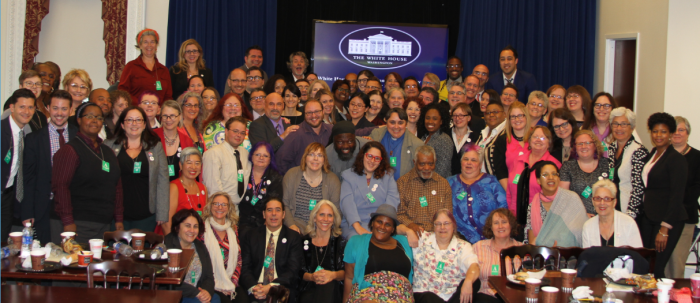Three days ago, I had the privilege of visiting the White House for the first-ever Bisexual Awareness Policy Briefing. This honor came to me as a board member of BiNet USA, an organization dedicated to raising the visibility of the bisexual community and awareness of issues affecting them. Being at the White House this week, with more than 100 activists who identify as bisexual and bi plus was exhilarating—and a long way from the day seven years ago when I came out as bi.
Like a lot of bisexual people, I recognized that I was bi at an older age. Until that point, I always thought of myself as straight and never thought or questioned otherwise. Through high school and college, I had boyfriends and the relationships were always fulfilling. I started to realize I was also attracted to women when I developed a crush on a former coworker, who ultimately ended up being my first girlfriend. My relationship with her was just as fulfilling as my previous relationships with men.
As a young adult, I was comfortable and confident with my feelings and quickly started identifying as bi. Up until that point I didn’t know other people who were out as bi, but the label immediately felt right to me, as did my place in the community. Being bi meant I could embrace my feelings for women without having to dismiss those I have for men, much less my previous relationships and what they still mean to me. Seven years later, those feelings haven’t changed.
One of the most common misconceptions about bisexuals is that we have the opportunity to choose privilege, meaning that, unlike those who identify as gay or lesbian, we have the choice to date someone of a different gender and, therefore, gain straight privilege. This simply isn’t true. When I am dating a women and we’re in public, some people may stare at us because of our relationship. The situation changes when my partner is a man, but that doesn’t make it a choice–it’s who I am.
Another issue that I struggle with, along with entire bi community, is having to come out over and over again—not just at the beginning of a new relationship, but to family and close friends time and time again. When you break up with or start dating someone new, you are expected to reaffirm to the world that you are bisexual. And the people around you feel that they are entitled to ask extremely personal questions about your relationship, such as “Are you going to date women or men next?”, “So if you have a girlfriend now does that mean you’re a lesbian?”, “Since you have a boyfriend, do you ever miss being with girls?”, and on and on. It’s constant, exhausting, stressful, and often, it’s easier to not come out in order to avoid the questions that follow.
But, for me, it’s important to come out whenever I can and affirm my place in the LGBTQ community. It’s easy for bisexual people to be ignored or forgotten, erasing an essential part of who we are, and I’m not willing to let that happen to me or anyone else.










